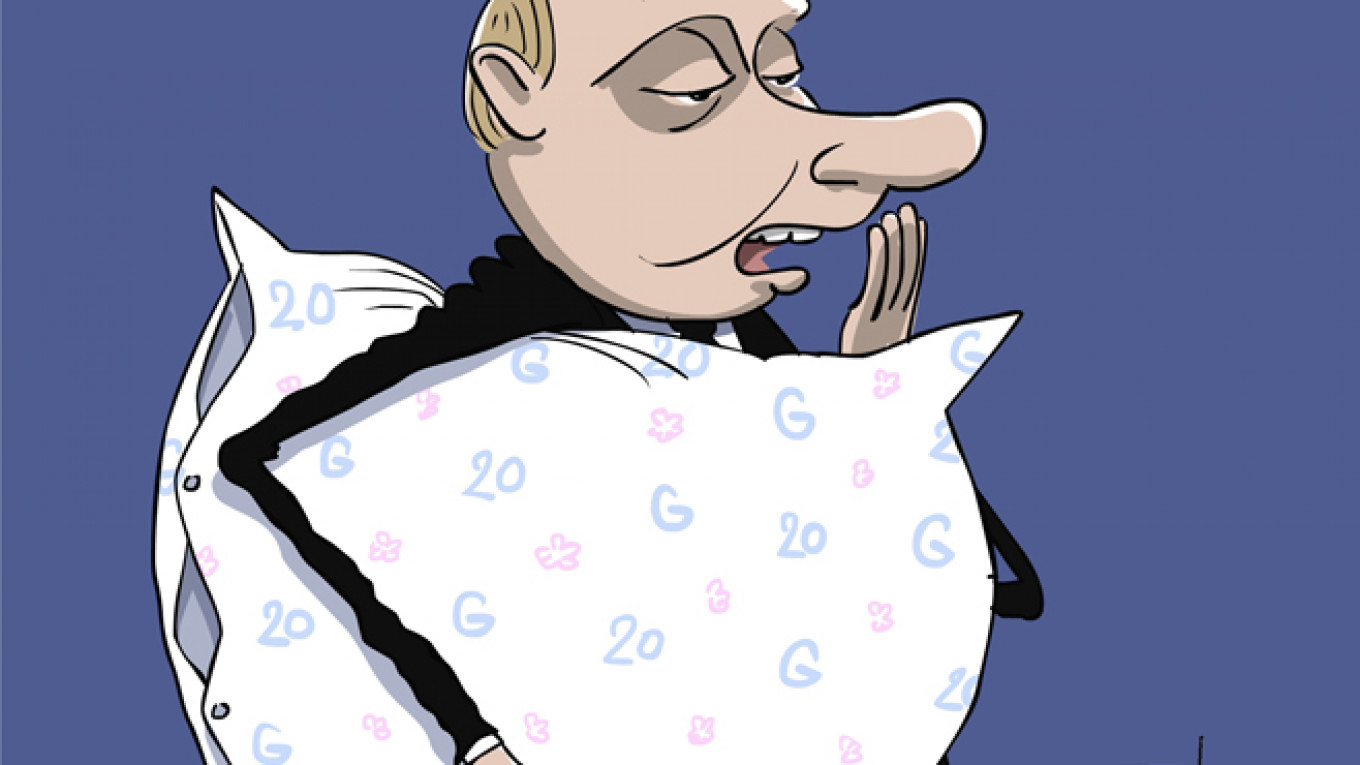So Russian President Vladimir Putin left the Group of 20 summit early because he needed to catch up on his sleep. Sure. He had about 17 hours of flying time to get back to Moscow, and somehow I doubt that the president of Russia has the same experience of economy air travel as we mortals, with on one side a squealing baby and on the other someone who gets you out of your seat every half-hour as he heads off to get something to drink or duly go to the bathroom.
So what does it say that Putin left early and used such a transparent excuse to do so?
Obviously, Putin was smarting at the reception he received in Brisbane. He is a man sensitive of his dignity and the dignity of his office. The visit started badly when Putin was greeted only by a junior minister, instead of the governor general and attorney general who welcomed the other leaders.
Then, Canadian Prime Minister Stephen Harper admirably overturned the usual cliches about Canadian overpoliteness by saying: "I guess I'll shake your hand, but I have only one thing to say to you: You need to get out of Ukraine."
Putin is a president who has increasingly allowed himself to be cocooned by likeminded allies and craven courtiers, and who avoids the Internet and even spends most of his time at his Novo-Ogaryovo residence rather than come into Moscow. The experience of being in the company of people who are not intimidated or impressed by him could hardly have been pleasant.
It's no wonder, then, that Putin cut and ran, especially before the rest of the G20 leaders' club started talking about Ukraine and he had to cope with the experience of being treated like the naughty schoolboy caught smoking behind the bike sheds.
But was he really expecting anything different? Did he genuinely believe he could face down other world leaders? He certainly did not seem at all nervous or even accommodating during his trip. If anything, he seemed unusually aggressive, even to the point of resorting to counterproductive rhetoric.
He castigated Ukrainian President Petro Poroshenko for his essentially symbolic decision to cut off government services to eastern Ukraine, noting that Moscow did not do the same to rebellious Chechnya. Of course, Moscow then brought Chechnya to heel with a savage invasion marked by endemic human rights abuses and the leveling of most of Grozny. One presumes that this was not quite the parallel Putin was commending to his Ukrainian counterpart.
Likewise, in an interview with German television — and Russia's European Union policy still assumes that where Berlin goes, the rest of Europe follows — Putin wondered whether those in favor of sanctions against Russia had "thought about what they are doing at all or not? Was something switched off in their brains?" Who was he insulting? The last serious survey of German public opinion revealed that more than 70 percent of the population supported sanctions.
So did Putin simply have a nasty shock when he arrived in Brisbane?
That might be part of it, but it also says something about how Putin feels about international institutions in general and especially those in which Russia is a minor player. He doesn't like them. He feels, not always entirely without reason, that they are mechanisms created by the West to protect its interests and force a series of values —democracy, free markets, transparency — down the throats of the rest of the world.
Of course, Putin uses international institutions and systems when he can, not least invoking them against the sanctions. Time and again he has argued, as in an interview with TASS last week, that they are illegal because and are "undermining the entire system of international economic relations."
But the true test of faith in an institution is a willingness to subordinate yourself to it when it is not in your direct interests. Putin's lack of respect for the G20 simply mirrors his lack of respect for international law and institutions alike. He based his justifications for the annexation of Crimea not on law but on some primordial duty to ethnic Russians. He has shrugged off criticisms from the OSCE and the International Court of Justice. His view is that Russian sovereignty must be entirely free from the constraints of global consensus and opinion.
Beyond that, though, it even seems that he wants to see the whole world free of these institutions. Perhaps it should not surprise us if a president who looks into history for his role models, from Pyotr Stolypin to Peter the Great, yearns for a simpler, primordial age when might made right and realpolitik was all. Walking out of the G20 when he felt like it, and not even bothering with a serious excuse, may seem petty, but it reveals a much deeper vein in his geopolitical thinking.
Mark Galeotti is professor of global affairs at New York University.
A Message from The Moscow Times:
Dear readers,
We are facing unprecedented challenges. Russia's Prosecutor General's Office has designated The Moscow Times as an "undesirable" organization, criminalizing our work and putting our staff at risk of prosecution. This follows our earlier unjust labeling as a "foreign agent."
These actions are direct attempts to silence independent journalism in Russia. The authorities claim our work "discredits the decisions of the Russian leadership." We see things differently: we strive to provide accurate, unbiased reporting on Russia.
We, the journalists of The Moscow Times, refuse to be silenced. But to continue our work, we need your help.
Your support, no matter how small, makes a world of difference. If you can, please support us monthly starting from just $2. It's quick to set up, and every contribution makes a significant impact.
By supporting The Moscow Times, you're defending open, independent journalism in the face of repression. Thank you for standing with us.
Remind me later.


